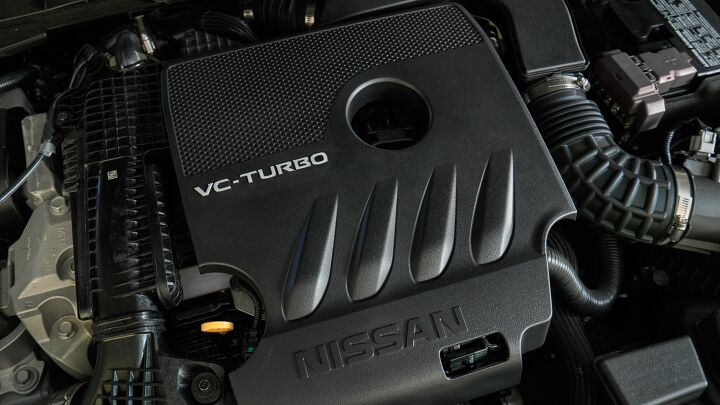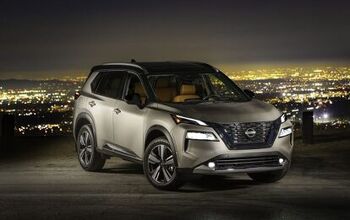The NHTSA is Investigating Nissan's Variable Compression Engine Problems

Nissan hailed its variable compression engines as great for performance and fuel economy, though the real-world benefits of the advanced mills haven’t completely lived up to the hype. They also appear to have issues that could cause a loss of power, knocking sounds, and engine failure in the most extreme cases, leading the National Highway Traffic Safety Administration to open an investigation.
The NHTSA is looking at more than 450,000 Nissan vehicles that use one of its two variable compression engines, including the Altima, Rogue, and Infiniti QX50. Owners have reported all sorts of issues with the 2.0-liter four-cylinder and 1.5-liter three-cylinder engines, but the automaker has not yet issued a recall to address the problems.
Variable compression technology allows the engines to shift their compression ratios to maximize fuel economy or power, depending on the situation. Despite those benefits, Nissan’s engines return only marginally better fuel economy, and the automaker remains the only company using the technology.
Though this is just an investigation at this point, the NHTSA could push for a recall if it determines that there is a defect. The complexity of the engines gives them their notable capabilities, but more complication isn’t always a good thing in mechanical systems. After all, there’s probably a good reason that other automakers haven’t followed Nissan down the variable compression path, and it’s likely because they’re expensive to develop and produce. Their complicated designs could have multiple possible failure points, which is less than desirable for a component that needs to run for tens of thousands of miles.
[Image: Nissan]
Become a TTAC insider. Get the latest news, features, TTAC takes, and everything else that gets to the truth about cars first by subscribing to our newsletter.

Chris grew up in, under, and around cars, but took the long way around to becoming an automotive writer. After a career in technology consulting and a trip through business school, Chris began writing about the automotive industry as a way to reconnect with his passion and get behind the wheel of a new car every week. He focuses on taking complex industry stories and making them digestible by any reader. Just don’t expect him to stay away from high-mileage Porsches.
More by Chris Teague
Latest Car Reviews
Read moreLatest Product Reviews
Read moreRecent Comments
- Ted The automotive period we are in reminds me of the malaise era of the 70s and early 80s. Government emission mandates exceeded the available engineering capabilities of most auto makers (sans Honda). Mileage, performance, and reliability all decreased. It wasn’t until both fuel injection and electronic engine control became available that all three improved again.Seems BEVs are in a similar spot; battery technology needs breakthrough improvement, charging needs to be faster and more ubiquitous. As those things happen, BEVs will make more sense.Agree the aspirational mandates are ahead of the current technology and infrastructure.
- Golden2husky This was a common topic at work - kids learned how to drive, and now another car is needed. I was amazed at all the excuses made about how their kid must have a new car. Used cars are a "risk" for breakdown, they are not as safe, etc...which is all BS of course. How much difference in safety is there between a new car and the same model that is five years old? Maintained cars don't break down very often. I've driven cars for far, far longer than most and have been towed exactly twice in my entire driving career (about 800,000 miles). While I wouldn't put my daughter into a 15 year old car and let her drive across the country, I would be fine with a 5 year old car that was well cared for. Let's be realistic - new drivers are likely to get into a fender bender - why do that to a new car. I was thrilled to get an 8 year old car for college back in the day even though my folks could afford to buy all of us new cars if they wanted to. If you Want to buy your kid new, go ahead. Just don't freak out when they come home with a fresh dent.
- CanadaCraig Can you eventually go to prison for driving without a licence in the US?
- CanadaCraig To hell with the UAW.
- CanadaCraig First I'll answer the question. YES. Toyota, Mazda and Subaru are doing the right thing. That said... If only those pushing for an all EV world would care as much about the 1 BILLION earthlings that make less than $1 a day.


































Comments
Join the conversation
"...but more complication isn’t always a good thing in mechanical systems."
"...but more complication is never, ever a good thing in mechanical systems, no exceptions."
FIFY
When I first saw a description of these engines I wondered how Nissan had made such a complex design reliable enough for mass production. Guess it turns out they didn’t. I am surprised the tech didn’t provide more efficiency benefits.